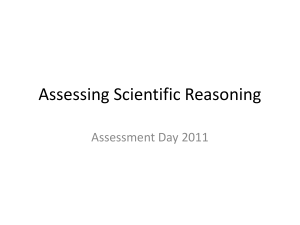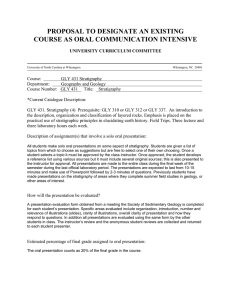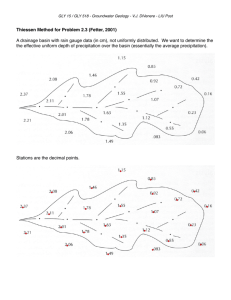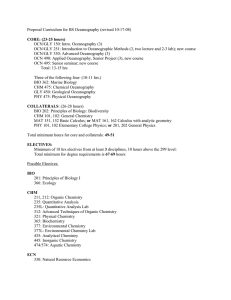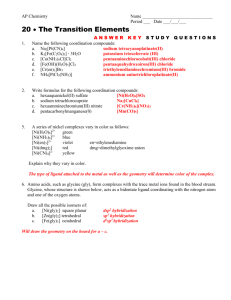environmental science - Earth, Ocean and Atmospheric Science
advertisement
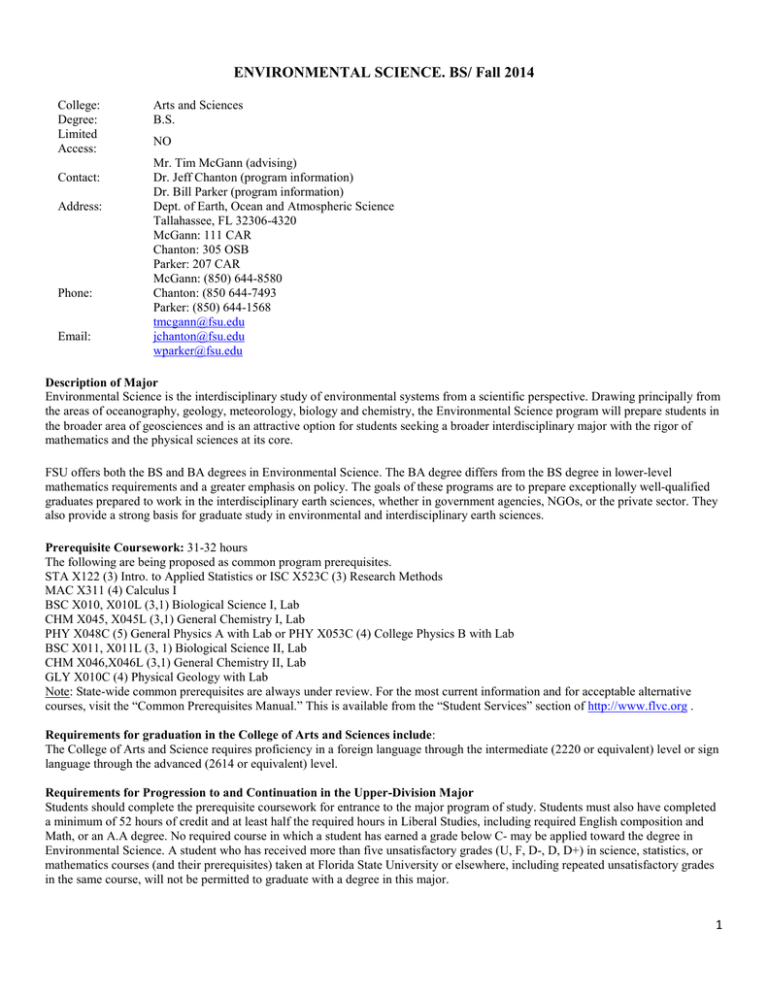
ENVIRONMENTAL SCIENCE. BS/ Fall 2014 College: Degree: Limited Access: Contact: Address: Phone: Email: Arts and Sciences B.S. NO Mr. Tim McGann (advising) Dr. Jeff Chanton (program information) Dr. Bill Parker (program information) Dept. of Earth, Ocean and Atmospheric Science Tallahassee, FL 32306-4320 McGann: 111 CAR Chanton: 305 OSB Parker: 207 CAR McGann: (850) 644-8580 Chanton: (850 644-7493 Parker: (850) 644-1568 tmcgann@fsu.edu jchanton@fsu.edu wparker@fsu.edu Description of Major Environmental Science is the interdisciplinary study of environmental systems from a scientific perspective. Drawing principally from the areas of oceanography, geology, meteorology, biology and chemistry, the Environmental Science program will prepare students in the broader area of geosciences and is an attractive option for students seeking a broader interdisciplinary major with the rigor of mathematics and the physical sciences at its core. FSU offers both the BS and BA degrees in Environmental Science. The BA degree differs from the BS degree in lower-level mathematics requirements and a greater emphasis on policy. The goals of these programs are to prepare exceptionally well-qualified graduates prepared to work in the interdisciplinary earth sciences, whether in government agencies, NGOs, or the private sector. They also provide a strong basis for graduate study in environmental and interdisciplinary earth sciences. Prerequisite Coursework: 31-32 hours The following are being proposed as common program prerequisites. STA X122 (3) Intro. to Applied Statistics or ISC X523C (3) Research Methods MAC X311 (4) Calculus I BSC X010, X010L (3,1) Biological Science I, Lab CHM X045, X045L (3,1) General Chemistry I, Lab PHY X048C (5) General Physics A with Lab or PHY X053C (4) College Physics B with Lab BSC X011, X011L (3, 1) Biological Science II, Lab CHM X046,X046L (3,1) General Chemistry II, Lab GLY X010C (4) Physical Geology with Lab Note: State-wide common prerequisites are always under review. For the most current information and for acceptable alternative courses, visit the “Common Prerequisites Manual.” This is available from the “Student Services” section of http://www.flvc.org . Requirements for graduation in the College of Arts and Sciences include: The College of Arts and Science requires proficiency in a foreign language through the intermediate (2220 or equivalent) level or sign language through the advanced (2614 or equivalent) level. Requirements for Progression to and Continuation in the Upper-Division Major Students should complete the prerequisite coursework for entrance to the major program of study. Students must also have completed a minimum of 52 hours of credit and at least half the required hours in Liberal Studies, including required English composition and Math, or an A.A degree. No required course in which a student has earned a grade below C- may be applied toward the degree in Environmental Science. A student who has received more than five unsatisfactory grades (U, F, D-, D, D+) in science, statistics, or mathematics courses (and their prerequisites) taken at Florida State University or elsewhere, including repeated unsatisfactory grades in the same course, will not be permitted to graduate with a degree in this major. 1 Mapping Mapping is FSU’s academic advising and monitoring system. Academic progress is monitored each Fall and Spring semester to ensure that students are on course to earn their degree in a timely fashion. Transfer students must meet mapping guidelines to be accepted into their majors. You may view the map for this major at www.academic-guide.fsu.edu. Major Program of Studies at FSU: 41-42 hours Environmental Science Core Courses (16-18 hours) MET 1010 (3) Introduction to the Atmosphere or MET 2700 (3) General Meteorology OCE 4008 (3) Principles of Oceanography OCE 4017 (3) Current Issues in Environmental Science or GLY 3039 (3) Energy, Resources and Environment GLY 4751C (3) Intro. to Remote Sensing or (if GLY4751 is not available) may substitute GIS 4043 and GIS 4043L (3,1) Geographic Information Processing & Systems, Lab OCE 4906 (4) Senior Capstone Offered Spring semester only. Environmental Science Elective courses: Choose a total of twenty-one hours, at least twelve of which must be selected from List 1 and the remaining nine hours from any of the elective lists below. List 1 (12 hour minimum): Geoscience Elective Courses: EOC 4631 Marine Pollution (3) OCB 4631 Estuarine and Coastal Ecology (3) GLY 2100 Historical Geology (3) GLY 3200C Mineralogy and Crystallography (3) GLY 3310C Igneous and Metamorphic Petrology (3) GLY 3400C Structural Geology (4) GLY 3610C Paleontology (4) GLY 4240 Principles of Geochemistry (3) GLY 4544C Sedimentation and Stratigraphy (4) GLY 4751C Introduction to Remote Sensing, Air Photo Interpretation and GIS for the Earth Sciences (3) GLY 4820 Principles of Hydrology (3) GLY 4884 Environmental Geology I (3) GLY 4905 Directed Individual Study (Geohazards) (3) MET 2101 Physical Climatology (3) or MET 3103C Climate Change Science (3) or ISC 2003 Global Change: Its Scientific and Human Dimensions (3) MET 3220C Meteorological Computations (3) MET 3300 Introduction to Atmospheric Dynamics (3) MET 4159r Special Topics in Meteorology (1–3) MET 4400C Meteorological Instrumentation and Observation (3) OCB 4631 Estuarine and Coastal Ecology (3) OCB 4637 Marine Benthic Ecology (3) OCC 4060 Environmental Science Modeling (3) OCE 3555 Environmental Science II: Habitable Planet (3) OCE 4265 Coral Reef Ecology (3) OCP 4005 Introduction to Physical Oceanography (3) OCC 4002 Introduction to Chemical Oceanography OCB 4637 Marine Benthic Ecology OCP 4005 Introduction to Physical Oceanography (3) OCE 4930r Studies in Oceanography (1–4) (Topics vary: Biodiversity, Earth Systems, Marine Microbial Ecology, Marine Conservation Biology, Geomicrobiology, (consent of adviser) , Physics and Flow of Water Bodies, Coral Reefs, Environmental Toxicology, Other classes are allowed as electives with department permission (six to seven hours maximum). Related Areas of Focus Environmental Engineering Tools (9-10 hour maximum) CGN 2327L Civil Engineering Graphics Lab (1) CEG 2202C Introduction to Geomatics Engineering (4) EES 3040 Introduction to Environmental Engineering Science (3) EES 3040L Environmental Engineering Science Lab (1) 2 EGM EGN ENV ENV ENV ENV 3512 2123 4001 4041 4341 4405 Engineering Mechanics (4) Computer Graphics for Engineers (2) Environmental Engineering (3) Environmental Systems Analysis (3) Solid and Hazardous Waste Engineering (3) Water Reuse Engineering (3) Environmental Geology/Geosciences (9-10 hour maximum) GLY 4084 Environmental Geology (3) GLY 4544C Sedimentation and Stratigraphy (4) GLY 4451 Introduction to Geophysics (3) GLY 4820 Principles of Hydrology (3) GLY 4905 Geohazards (3) GLY 4249 Principles of Geochemistry (2) *Environmental Science Students with a focus area in GLY, wanting to use Field Camp as their Capstone should take the following coursework: GLY 4544C Sedimentation and Stratigraphy GLY 3400C Structural Geology GLY 4790 Field Camp/Field Geology (Substitute for BS Environmental Science Capstone) Biology (9-10 hour maximum): BOT 4394 BSC 3052 BSC 3312 BSC 3402L BSC 3930 BSC 3938 BSC 4473C BSC 4933r PCB 4674 ZOO 4454C Plant Molecular Biology (3) Conservation Biology (3) Marine Biology (3) Experimental Biology Laboratory (3) Seminar in Biological Frontiers (1) Careers in the Biological Sciences (1) Introduction to Scientific Diving (3) Selected Topics in Biological Science (1–4) Evolution (3) Biology of Fishes (4) Chemistry (9-10 hour maximum) CHM 2210 CHM 2211 CHM 2211L CHM 3120 CHM 3120L CHM 4080 CHM 4081 Organic Chemistry I (3) Organic Chemistry II (3) Organic Chemistry II Laboratory (3) Analytical Chemistry I (3) Analytical Chemistry I Laboratory (1) Environmental Chemistry I (3) Environmental Chemistry II (3) Geography/GIS (9-10 hour maximum) GEO 2200C Physical Geography (3) 4114 Environmental Field Methods (3) GEO 4162C Spatial Data Analysis (3) GEO 4340 Living in a Hazardous Environment (3) GEO GEO 4357 Environmental Conflict and Economic Development (3) 4376 Landscape Ecology (3) GEO GEO 4930r Special Topics in Geography (1–3) 3015 Map Analysis (3) GIS 4006 Computer Cartography (3) GIS 4043 Geographic Information Systems (3) GIS 4043L GIS Lab (1) GIS 3 Graduate School Preparation: (no maximum) BSC 2011/L Biological Science II/ Lab (4) CHM 1046/L General Chemistry II/ Lab (4) CHM 2210 Organic Chemistry I (3) CHM 2211 Organic Chemistry II (3) CHM 2211L Organic Chemistry II Lab (3) MAC 2311 Calculus with Analytic Geometry I (4) MAC 2312 Calculus with Analytic Geometry II (4) MAC 2313 Calculus with Analytic Geometry III (5) PHY 2049C General Physics B (five hours at FSU) (5) Collateral Minor. 0 beyond required courses Twelve hours of required coursework in the EOAS classes in Geology, Meteorology, and/or Oceanography constitute a minor in Earth, Ocean and Atmospheric Science. If a student takes 12 hours in any one of these subject areas then their collateral minor would be in that discipline. For instance, 12 hours of Geology would constitute a minor in Geology. Computer Skills Competency: 0 hours beyond other requirements. BSC 2010L (1). Oral Communication Competency: 0-3 hours. Students must demonstrate the ability to orally transmit ideas and information clearly. This requirement may be met through appropriate high school speech training or with an approved college-level approved course, such as SPC 1017 or SPC 2608. Minimum Program Requirements Summary Total Hrs. Required 120 Liberal Studies 36* BS Prerequisite Coursework 27-29* BS Major Coursework 41-42* Minor Coursework 0 beyond other requirements Foreign Language 0-12 (depending on placement) Computer Skills 0 beyond major Oral Communication Competency 0-3 Electives to bring total hours to 120 *Note: Some coursework required for this major (prerequisite/collateral/major) may also be applied to Liberal Studies or minor requirements. Remarks: 1. A minimum of 45 hours at the 3000 level or above, 30 of which must be taken at this University. 2. Half of the major course semester hours must be completed in residence at this University. 3. The final 30 hours must be completed in residence at this University. Employment Information Representative job titles related to this major: Environmental technician, geoscientist, environmental scientist, hydrologist, general physical scientist, and oceanographer. Some positions may require additional education or training. Representative Employers: Federal, state, and local governments; NGOs; private employers. Updated: November, 2014 © The Florida State University, Tallahassee, FL 32306 Questions or Comments | Privacy Policy | Copyright | Webmaster 4
